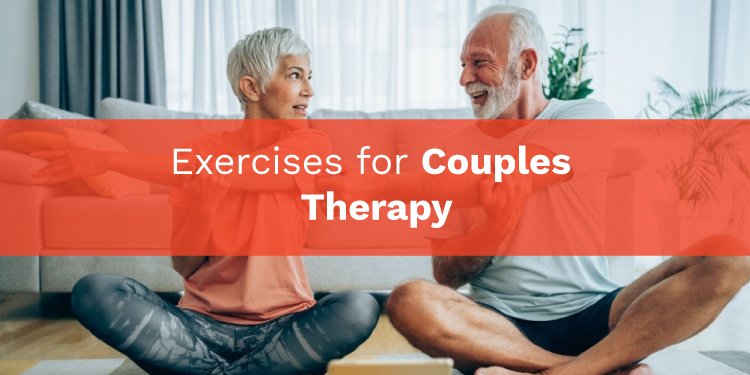Counseling and therapy can help partners at any stage of their relationship. Most people think of couples counseling as a last resort before a divorce or breakup. But the truth is that these sessions may teach happy, healthy couples vital lessons as well. Read this blog to learn exercises for couples therapy.
Connection is important in a love relationship. But when life’s stresses pile upon you, the effort you make to your partner may fade to the background. It’s observed that, especially in long-term relationships, people take their partner’s presence and support for granted. So, more people seek the help of qualified specialists.
Couples therapy activities help you reframe issues, build emotional connection, or increase appreciation for each other. If you try to take a little step forward, you’ll almost likely learn something new about your partner, and your relationship will benefit.
It’s easy to understand how challenging relationships may be. Until we can find a recipe for a flawless relationship that guarantees 100 percent success, We have to do our best by adopting what’s known:
- Improving our relationship skills.
- Effective communication.
- Engage in activities that strengthen our bond.
- To address any major concerns.
Table of Contents
Couple Therapy
Every relationship has a stumbling block. Learning how to resolve disagreements will help you resolve your problems and strengthen your relationship. Like any other type of treatment, couples counseling is necessary for both parties’ dedication and desire to open up.
Couples counseling can benefit a relationship, regardless of sexual orientation or age. When going to couples counseling, keep an open mind and get prepared to tear down communication obstacles.
Hsueh says, “Couples can form a more secure bond with one another and be able to have vulnerable conversations without pushing the other person away.”
Advantages of Couples Therapy
Every couple can enjoy couples counseling and learning to enhance their connection with their loved one, regardless of their condition. It may be a good alternative for you if you need to refresh your relationship.
The advantages of couples therapy are limitless. The sheer act of seeking couples counseling can show the significance and value you have in your relationship. Couples counseling has several advantages, including:
- minimizing strain and conflict in your relationship by learning new ways to connect with your partner
- set aside time to work on improving your relationship in creating a safe, and quiet environment
- making action plans to make your relationship a priority using ways to improve emotional and physical intimacy
- recognizing and working around unhealthy or hurtful habits in your relationship
- regaining one another’s trust
- identifying and honing important conflict resolution skills
- establishing a common ground and learn to relate to one another in a loving and kind manner
Some Couples Therapy Exercises
There are a variety of couples therapy exercises. You can try those exercises at home to strengthen your relationship and to improve communication and trust. These approaches for couples therapy can help you communicate more effectively and set goals for your future together. These couples therapy activities have many advantages, both before and after marriage.
While quality time spent on a romantic trip can surely help, time and money aren’t always on our side. Finding time for a date night may seem unattainable for some busy couples, especially those with children. But with a few tips and tactics, you and your other half can connect every day, even when you only have a little time.
These tactics will help you and your partner get on the same page. With this, you can grow closer than before, whether you’ve been in a relationship for months or many years. If you aren’t ready to see a therapist yet, there are a few successful couples therapy exercises you can undertake.
Understanding love language
Just because you’re in a relationship doesn’t guarantee both of you feel the same way about love. Everyone’s perspective of love is unique, so you must understand what makes your partner feel loved.
A book by Dr. Gary Chapman, “The 5 Love Languages,” has helped couples figure out what makes them feel loved so that both of them can show up for each other.
Love language depends on the premise that each person prefers to receive love in one of five different ways:
- giving and receiving gifts
- gestures of kindness
- words of encouragement
- time well spent
- physical contact
Take the online questionnaire with your spouse to learn about your love language and gain a deeper understanding of one another.
Rituals
Rituals are the acts that you repeat regularly. It’s chosen, formed, and practiced habits. The rituals listed below helps people bond, and what matters is that couples repeat them frequently and regularly. The following are some suggestions for everyday rituals.
Morning customs: Mornings can be very pleasant when everyone gets sent off with good wishes and a happy attitude. Make a routine with your partner to kiss or hug when leaving.
Reunions: Give an expressive greeting a passionate kiss that lasts several seconds when you return home, not just a peck on the cheek.
Mealtimes: Talk about the events of the day during mealtime. Make meals a peaceful, affectionate, supportive, and attentive setting. Dinners should be free of confrontation.
Bedtimes: Going to bed allows for hugging and the release of tension and anger. Go to bed with a kiss, an embrace, a comment about something you’re grateful for in the relationship, or something pleasant to say about your partner.
Listening With no Interruption
This well-known couples counseling activity emphasizes both verbal and nonverbal communication. Both partners speak and listen to one another according to their turn.
Set a 3-minute timer for yourself. One partner has the opportunity to speak freely about whatever they are thinking or feeling, about what’s been on their minds lately, or whatever they want.
Then it’s time to switch roles so that both partners have a chance to practice listening. The receiver does not provide any vocal feedback or guidance. You visualize your partner’s remarks as a continuous stream of emotion and take it all in.
The other partner is not permitted to speak but may express empathy and understanding through nonverbal means. You are free to use your eyes or body language, but, as the receiver, all you have to do is listen to whatever the speaker says.
Soul Gazing
This practice is likely to re-spark the flames in a world that always attempts to capture our attention and distract us. It will offer you and your spouse the slowed-down connection you’re seeking when performed few times a week.
Making long-term eye contact with your partner can help you both feel more connected. It can help you recognize emotions, create trust, and promote intimacyTrusted Source.
To engage in soul gazing exercise, face each other in a seated position with your knees near to touching and maintain eye contact for 3-5 minutes. If this is your first time, it may feel a little strange for the first 1-2 minutes.
You have permission to blink, but you should refrain from speaking during the workout. If the silence is too much for you, pick a song and commit to keeping eye contact for the duration of it.
Trust Fall
A variety of team-building exercises include trust falls. It’s a trust-building practice that requires some trust at the beginning, as the name implies. One person stands straight and lets themselves fall without trying to stop, trusting their partner to catch them. They’re made to help you trust your partner in any situation.
To do a trust fall, all you have to do is stand straight in front of your partner with your back to them. The person in front falls backward with their eyes closed onto the person in the back, who catches the falling person.
The individual in front must assume without question that their companion will “have their back.” Once you’ve learned to trust someone with this basic responsibility, you’ll be able to trust them in other areas of your life.
Practice Yoga Together
Consider doing couples yoga with your significant other. As you follow through various exercises during partner yoga, it allows you to balance with your partner, creating and strengthening trust.
Mindfulness is also connected to enhanced relationship satisfaction. You’ll be able to connect with your partner during your practice when you synchronize your breathing. The benefits may outweigh your yoga session if you can properly connect with your partner.
Icebreakers
Icebreakers are a tried and true conversation starter that could help rekindle your romance. It helps to tell you something new about your partner, which aids in bringing both of you closer.
It is also performed in situations where strangers need to communicate or collaborate. But, you don’t have to talk with a stranger this time; instead, you’ll learn more about your spouse.
Even if you believe you already know everything there is to know about your partner, it might not be true. Ask them some fun icebreaker questions that guarantee to reveal at least one or two new facts about them.
Set some time to address icebreaker questions that delve past the surface to reintroduce yourself to your spouse. Ask them questions like these:
- Tell me a strange fact about yourself.
- Let me know what your favorite ice cream flavor is.
Use this practice whenever you need to strengthen your bond with your partner and prepare to discover something new.
Extended Cuddle Time
It is so basic yet so often overlooked. Having a long cuddle session a few times a week, whether it’s during bedtime, can do wonders for your intimate relationship. Cuddling also releases happy hormones in your brain that make it simpler to fall asleep.
Cuddling with your lover feels great because it encourages your body to release oxytocin, reducing cortisol, which is the stress hormone.
It can also help to reduce resting blood pressure and manage sleep patterns, according to Penn Medicine. Your body is doing its job if you’re feeling warm and cuddly. Discuss it with your partner, and then make it a non-negotiable connection practice in your lives.
Breathing Exercise
Simple breathing exercises with your partner can help you reconnect with your mate. Begin by sitting back to back in a comfortable position, then concentrate on your breathing. Feel the movement of your ribcage and, eventually, your partner’s. Bring your breath rhythms into harmony with each other for a few minutes, then hug each other.
This exercise is a physical technique for being physically and emotionally in sync with one another. You’ll be able to align with your spouse in other ways after you’ve developed the patience to get in sync. Mindful breathing can also help to reduce stress, which is beneficial to everyone. buy xanax nyc https://www.sunjournal.com/
Never go to bed angry.
“Don’t go to bed angry” is a saying you’ve probably heard before. What appears to be a simple concept is an important component of at-home marital therapy exercises. When you go to bed furious, you leave issues unresolved and allow yourself to think about them all night.
You will both get too bitter if you wait too long to confront and solve the problem. You can go forward to a better quality of life if you solve the problem immediately.
Share Music
Music can be very personal and meaningful, and having similar musical tastes strengthens your bond. So, swap playlists to learn more about each other’s romantic side.
While sharing something so personal with your partner may make you feel vulnerable, it’s a risk that pays off. The payoff could be a more intimate and connected relationship with your spouse, which would be well worth the risk!
Spend some time reflecting and listening to some of your favorite tunes. Share these songs with your spouse, along with an explanation of how they pertain to you and why you chose them to share.
Find songs that speak to you, reflect your personality, or express some of your most sincerely held values. It can help you, and your spouse gains a deeper understanding of each other, yourself, and your relationship.
Watch (and discuss) Romantic movies.
Select a romantic movie or a movie that interests you both to watch together. Chat about it afterward if you’re having problems communicating or feel like you have nothing to say to each other. Couples who watch a series of movies and discuss them afterward have relationship benefits comparable to those seen in couples counseling.
It allows you to practice talking about relationship concerns in a non-threatening and low-stakes environment. Couples grow confident in their capacity to talk about difficult things over time. With this couples will get more equipped to openly discuss their concerns.
The 7 Breath-Forehead Connection Exercise
Compared to the previous connection exercises, this practice may appear new-age, but it’s still fantastic. Face each other directly and softly touch your foreheads together, whether you’re lying on your sides or sitting erect. Put your chins down so that your noses don’t quite touch (it’s fine if they do, but it’s not required for this exercise).
Breathe seven long, slow breaths in unison with your partner while your foreheads are touching. Like the eye contact exercise, the first couple of breaths may feel like they’re occupied with a lot of conscious thinking. But, by the third or fourth breath, it’ll feel completely normal.
This activity isn’t restricted to seven breaths, and you can go for longer if you want to. But seven breaths are the ideal least number of breaths for couples to connect and drop into the present. You can do this for several minutes if you and your companion are overachievers who enjoy doing extra time.
Disconnected From Technology
Most adults in committed relationships say cellphones distract them while they’re alone together. Set aside time to detach and communicate with each other if your relationship gets affected by distraction and a sense of absence.
It’s astonishing how technology can serve as a source of distraction. Disconnecting from the internet and spending time with your partner might be helpful for the relationship.
With no phones, televisions, laptops, or iPads, you and your partner alone, enjoying quality time together. You can play board games, massage each other, take a nice bath, or do anything else that doesn’t need the use of devices. It will allow you to focus 100 percent of your energy on the other person, allowing you to become closer as a couple.
Emotion Check-ins
Emotion check-ins purpose a feelings wheel as a way to connect. Each partner should pick three emotions from the day and communicate them with the other. Remember that the motive of this exercise is to share and reflect, not to correct or defend.
Making a spouse feel heard, loved, and supported requires emotional validation. Active listening and reflecting on the other person’s emotions can help couples improve their communication skills and intimacy. You’ll also have a better notion of how to help your partner if you’re aware of what they go through regularly.
The Weekly Meeting
Sometimes you or your partner might have a hectic schedule. Several communication failures can occur due to unfinished arguments, unmet expectations, unheard desires. Consider the weekly meeting as an opportunity to get all your unresolved business out in the open.
Schedule an unavoidable 30-minute connection block where you and your partner remove all distractions (phones, computers, children, etc.). After that, talk like the intentional grownups you both are for this connection exercise. In an ideal world, everyone should have the skill to express themselves without interruption.
It’s usual for couples to miss connections during the week, and big chats aren’t always possible in hectic schedules. It’s critical to note how you feel, so stress doesn’t build up.
In a relationship, both parties are CEOs. Both partners have demands and expectations that need space to discuss in an open and pleasant environment.
Wish List
Make a “wishlist” to establish a secure area where you may communicate your relationship needs. Take time to note down and share things you’d prefer more or less of in the relationship. Use “I” phrases to communicate your emotions and describe how you would feel if your wish came true as you share.
Relationships have room to grow, but if you communicate ineffectively, that progress might halt. The wishlist exercise promotes mutual understanding and allows each partner to express their desires. Sharing how you’d feel if the change occurs may also assist your spouse in seeing what your relationship may be like if you both put in the work.
Why Seek Couple Therapy?
Couples can begin therapy for any reason that causes them difficulty, distress, or mistrust when committing. The various reasons to seek couple therapy:
- After infidelity or deception, it is necessary to re-establish trust.
- If you’re unhappy with your physical or emotional closeness, you can use it to help you overcome trauma.
- When two people are going through a transition together, such as parenthood or a major move, they may have opposing ideas on parenting.
- To have a better understanding and to avoid future problems.
- To resolve anger issues that make conflict resolution more difficult.
- dealing with infertility
- Job changes and stresses in the workplace
- financial difficulties
- To have fun in your relationship and reignite your spark.
Conclusion
There is no such thing as a minor or large problem when it comes to improving a relationship. Therapy exercises and procedures will help you repair your relationship and improve communication with your partner. It helps you from feeling detached from your partner to overcoming infidelity.
Every relationship can share issues, and even a healthy relationship can have some concern for both partners. The underlying message is that no relationship is perfect, but there are ideal ways to show up for each other when things get tough. You can always find new and exciting activities to do together.
Frequently Asked Questions
How do marriage counseling and couple therapy differ?
Couples therapy looks back into your relationship to see why certain problems have arisen. But, marriage counseling focuses on working through your current relationship problems in the here and now.
Why isn’t couples counseling working for oneself?
Partners enter therapy with various goals in mind, and it won’t work if the two partners have opposing goals. Counseling, for example, will not work if one spouse is more devoted to performing the necessary work than the other.
What makes a relationship happy?
Instead of always attempting to be right, for a good relationship, try to sympathize and comprehend each other’s views. It all comes down to a basic principle when it comes to managing your stress and emotions. Don’t say anything when you feel angry, and don’t act out.
















